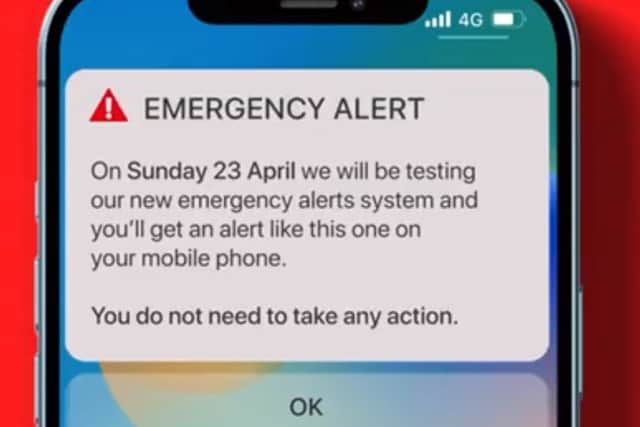UK emergency alert: exact time text is sent, is it just on iPhone, what does it mean - can you turn it off
and live on Freeview channel 276
Millions of mobile phones and tablets across the UK will emit a loud alarm and vibrate as an emergency alert test takes place this weekend.
The government has confirmed the exact time you can expect to receive a siren-like message has been confirmed. For around 10 seconds on Sunday (April 23) your phone will vibrate and make a loud sound, even if it is set to silent, signifying the arrival of the message. But despite all the bells and whistles, it is nothing to worry about.
Advertisement
Hide AdAdvertisement
Hide AdThe new emergency alerts system will allow government and emergency services to send out warnings in life-threatening situations such as arrival of floods or wildfires. Messages of this kind will provide clear instructions about how best to respond.
During the developement, it has been tested locally in East Suffolk and Reading on previous occasions. However it is now ready for a nationwide test.
Here is what to expect:
When will the emergency alert be sent?
The text will be sent to phones across the UK on the evening of Sunday, 23 April. It will be sent at 3pm.
The system is intended to be used in life-threatening situations including flooding and wildfires. The Government has released the text that will pop up on people’s home screens next Sunday.
Advertisement
Hide AdAdvertisement
Hide AdThe message will be received on 4G and 5G mobile phones, along with sound and vibration for up to 10 seconds even if devices are on silent.


What to expect from the message?
When the text arrives your mobile will start to vibrate and will make a loud siren-like noise, making sure to catch your attention. It will last for around 10 seconds.
The wording of the message will vary across the United Kingdom. The message will be received on 4G and 5G mobile phones.
In England it will say: “This is a test of Emergency Alerts, a new UK government service that will warn you if there’s a life-threatening emergency nearby. In a real emergency, follow the instructions in the alert to keep yourself and others safe.
Advertisement
Hide AdAdvertisement
Hide Ad“Visit gov.uk/alerts for more information. This is a test. You do not need to take any action.”
Phone users will be prompted to swipe away the message or clicking “OK” on their home screen before being able to continue using their device. Drivers are advised not to look at or touch their phone until it is safe, just as when receiving any call or message.
Chancellor of the Duchy of Lancaster Oliver Dowden said: ““At 3pm next Sunday we’ll be doing a nationwide test of our new Emergency Alerts system. Getting this system operational means we have a vital tool to keep the public safe in life-threatening emergencies.
“It could be the sound that saves your life.”
Domestic abuse campaigners raise concerns about alert
Domestic violence campaigners have warned the test could put people in danger by revealing the location of secret phones hidden away by those at risk.
Advertisement
Hide AdAdvertisement
Hide AdThe Government said it has been actively engaging with organisations working with vulnerable women and girls to ensure they are not adversely affected by the introduction of emergency alerts. Officials stressed that it is easy to opt out of the system if people need their phone to stay concealed, either by turning off emergency alerts in their settings or simply having the phone switched off during the test.
Alert to clash with major sport events
The test on St George’s Day coincides with major events including the London Marathon and the 2pm kick-off Premier League ties between Bournemouth and West Ham and Newcastle and Tottenham Hotspur. Officials said they have worked with the Football Association and the Marathon’s organisers to make sure the impact of the test will be limited.
Chief fire officer Alex Woodman, from the National Fire Chiefs’ Council, said: “We must use every tool at our disposal to keep people safe, and we need everyone to play their part, and the new Emergency Alerts system is one way we can do this. For 10 seconds, the national test may be inconvenient for some, but it’s important, because the next time you hear it, your life, and the life-saving actions of our emergency services, could depend on it.”
Can you turn it off on Android and Apple?
The siren-like sound your phone will make after you receive the alert will certainly be startling. But is it possible to actually switch it off?
Advertisement
Hide AdAdvertisement
Hide AdOur sister title The Star reports that a tech safety team at Refuge have put together a guide for how to turn off the emergency alert system for both Apple and Android users. Here is all you need to know:
How to turn alert off on Apple phones
- Go to the settings app of the Apple device
- Scroll down to find and click or tap on the ‘Notifications’ tab
- Scroll all the way down again to find a dedicated section for Emergency Alerts
- You will see ‘Extreme Alerts’ and ‘Severe Alerts’ buttons, but this sometimes varies depending on which iPhone or Apple device you are using.
- To turn them off, press all the toggle buttons (blue means on, grey means off)
How to turn alert off on Android phones
- Go to the settings app of the Android device
- Search for ‘Emergency Alerts’ using the search bar at the top of the screen
- Click or tap on the first option that pops up
- Once in the device’s Emergency Alerts settings page, turn off Emergency Alerts by pressing all the toggle buttons (blue means on, grey means off)
What will the message say?
England, Northern Ireland and Scotland
The alert will say: “This is a test of Emergency Alerts, a new UK government service that will warn you if there’s a life-threatening emergency nearby. In an actual emergency, follow the instructions in the alert to keep yourself and others safe.
“Visit gov.uk/alerts for more information. This is a test. You do not need to take any action.”


Wales
The alert will contain the message in both Welsh and English. It will say: “Prawf ar Rybuddion Argyfwng yw hwn, sef gwasanaeth newydd gan lywodraeth y DU a fydd yn eich rhybuddio pan fydd argyfwng sy’n berygl i fywyd gerllaw.
Advertisement
Hide AdAdvertisement
Hide Ad“Mewn argyfwng go iawn, dilynwch y cyfarwyddiadau yn y rhybudd i’ch cadw chi ac eraill yn ddiogel. Ewch i gov.uk/alerts i gael rhagor o wybodaeth. Prawf yw hwn Does dim angen i chi wneud dim.
“This is a test of Emergency Alerts, a new UK government service that will warn you if there’s a life-threatening emergency nearby. In an actual emergency, follow the instructions in the alert to keep yourself and others safe.
“Visit gov.uk/alerts for more information. This is a test. You do not need to take any action.”
When will alerts be sent in future?
Emergency Alerts will be used very rarely - only being sent where there is an immediate risk to people’s lives - so people may not receive an alert for months, or even years. The alerts will only ever come from the Government or emergency services, and they will issue a warning, always include the details of the area impacted, and provide instructions about how best to respond.
Advertisement
Hide AdAdvertisement
Hide AdThe initial use will focus on the most serious severe weather-related incidents, including severe flooding in England.
Chancellor of the Duchy of Lancaster, Oliver Dowden MP, said: “We are strengthening our national resilience with a new emergency alerts system, to deal with a wide range of threats - from flooding to wild fires. It will revolutionise our ability to warn and inform people who are in immediate danger, and help us keep people safe. As we’ve seen in the U.S. and elsewhere, the buzz of a phone can save a life.”
Chair of the National Fire Chiefs Council, Mark Hardingham added: “Together with every fire and rescue service in the country, I’m looking forward to having Emergency Alerts available to help us to do our jobs and to help communities in the event of emergencies.
“We’ve seen this type of system in action elsewhere across the world and we look forward to having the facility here in the UK - by working together with fire services and partners we want this system to help us to help you be as safe as you can if a crisis does hit.”
Comment Guidelines
National World encourages reader discussion on our stories. User feedback, insights and back-and-forth exchanges add a rich layer of context to reporting. Please review our Community Guidelines before commenting.